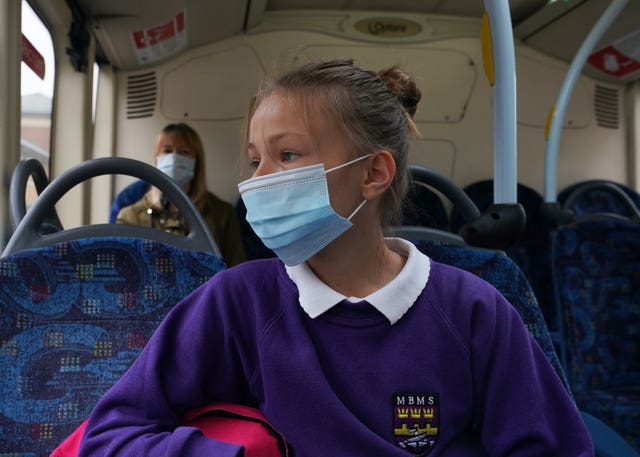Children urged not to hug grandparents until vaccine rollout impact is known
Dr Jenny Harries said a ‘steady course’ is needed through the road map out of lockdown.

Children should not hug grandparents until the Government is “absolutely sure” about the impact of the coronavirus vaccine rollout, a top medic has warned.
Dr Jenny Harries, deputy chief medical officer for England, also said the rise of the Kent variant of Covid-19 meant it was right to take “additional precautions” by extending the use of face coverings in schools.
She said a “steady course” needs to be taken through the road map out of lockdown.
“The testing programme in schools is clearly going to mean that people, parents, grandparents and teachers and other schoolchildren, can be very assured schools will be as safe as they can be because we are trying to remove infection from that environment,” Dr Harries told a Downing Street press briefing.
“And of course, that will have a really positive impact on breaking chains of transmission in communities and in those families.
“But the slight caveat to that is, having got so far down the line with this and now on the road map, very, very carefully coming out, I would encourage children not to go off yet, even if their grandparents have had their vaccinations.
“Not to go hugging them too much until we’re absolutely sure what the impact of that vaccine rollout has been.
“I’m sure it’s going to be positive but we just need to take a steady course through the road map.”
Asked about the Prime Minister saying in August that making children wear masks in schools was “nonsensical”, Dr Harries said: “Face coverings are there to help others – we are protecting others by wearing them.
“There are a number of different conditions at the moment.
“For example, we have a new variant, and while we are understanding that more, then obviously taking additional precautions makes sense.
“We understand more about the ability for aerosol generation and transmission, so that is also important.
“So things, I think, have moved on and it should be reassuring to know that we look at the evidence and then adjust our advice accordingly.”
Meanwhile, Education Secretary Gavin Williamson said schools were being asked to keep open some capacity for testing pupils who could not get home support to carry out twice weekly testing.
He said: “I certainly hope that parents will be encouraging and supporting children but we are also asking schools to keep open an asymptomatic testing centre so if children haven’t been able to get the support or help that maybe they need to do the test at home, it is possible to do the test in school as well.”
Dr Harries said the tests were “very simple things to do” and “many of the public” were doing them.
She added that teachers should be “particularly assured” that the testing set-up in schools is “very similar” to what is happening with healthcare workers.

Dr Harries also said it is “very likely” the new testing regime in schools will lead to the discovery of new cases but it is hoped the system will make education settings Covid-free and possibly lead to a rethink on the wearing of face coverings.
“If testing is coming into place in schools, we will see but it is very likely we will find a few cases, and some children will have to stay at home, unfortunately, for a short period at the start of term.
“But then, over time what will happen is that those school environments should be more or less free of infection and at that point, as the Secretary of State has said previously, around Easter time, that (the wearing of face coverings) is another issue to consider.
“It is important (to review it), many children can’t communicate well, particularly small children, which is why this hasn’t been suggested for primary schools.
“And (it is) really important to understand that any child or any adult or other people helping them who need to be able to be seen to communicate effectively, then there are exemptions for this just as there are for our general use of face coverings in public.”





